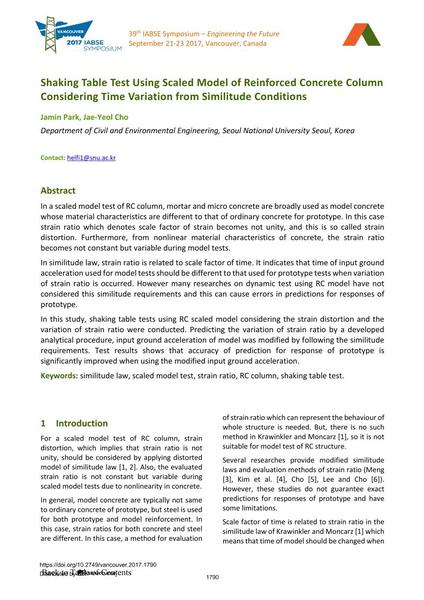Shaking Table Test Using Scaled Model of Reinforced Concrete Column Considering Time Variation from Similitude Conditions

|
|
|||||||||||
Détails bibliographiques
| Auteur(s): |
Jamin Park
(Department of Civil and Environmental Engineering, Seoul National University Seoul, Korea)
Jae-Yeol Cho (Department of Civil and Environmental Engineering, Seoul National University Seoul, Korea) |
||||
|---|---|---|---|---|---|
| Médium: | papier de conférence | ||||
| Langue(s): | anglais | ||||
| Conférence: | IABSE Symposium: Engineering the Future, Vancouver, Canada, 21-23 September 2017 | ||||
| Publié dans: | IABSE Symposium Vancouver 2017 | ||||
|
|||||
| Page(s): | 1790-1797 | ||||
| Nombre total de pages (du PDF): | 8 | ||||
| Année: | 2017 | ||||
| DOI: | 10.2749/vancouver.2017.1790 | ||||
| Abstrait: |
In a scaled model test of RC column, mortar and micro concrete are broadly used as model concrete whose material characteristics are different to that of ordinary concrete for prototype. In this case strain ratio which denotes scale factor of strain becomes not unity, and this is so called strain distortion. Furthermore, from nonlinear material characteristics of concrete, the strain ratio becomes not constant but variable during model tests. In similitude law, strain ratio is related to scale factor of time. It indicates that time of input ground acceleration used for model tests should be different to that used for prototype tests when variation of strain ratio is occurred. However many researches on dynamic test using RC model have not considered this similitude requirements and this can cause errors in predictions for responses of prototype. In this study, shaking table tests using RC scaled model considering the strain distortion and the variation of strain ratio were conducted. Predicting the variation of strain ratio by a developed analytical procedure, input ground acceleration of model was modified by following the similitude requirements. Test results shows that accuracy of prediction for response of prototype is significantly improved when using the modified input ground acceleration. |
||||
